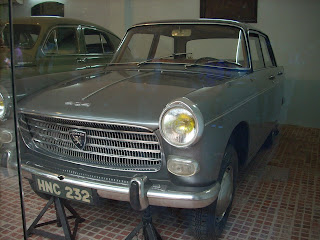Good to know, considering our recent reaching out to Vietnam,
partly to make a point to the Chinese . . .
And there are turtles there. REALLY BIG ones, endangered
soft-shell Rafetus swinhoei for you critter buffs out there. The bridge
to the temple is beautiful, and many people are leaving joss sticks to take
smokey prayers to the gods.
So far, religion in the form of Taoist and Confucian beliefs seems very strong here, woven into every day life. We visited several sites dedicated to Confucian teaching, and scholarship. Education is the goal of every guide we met, here and in Laos and Cambodia as well. Much sacrifice goes into getting kids into higher education, and young people work very hard and patiently for that goal.
Jules and me on the bridge to Ngoc Son.
And what god would turn down an
Oreo cookie offering?
Much less White
Castle?
Below, our fearless leader L, with
the cadres at Ngoc Son. To the right is K. Their stories will make this trip a much deeper pilgrimage for us all.

And on to the next stop - The Tomb of Ho Chi Minh, Father of the Land.
So far, religion in the form of Taoist and Confucian beliefs seems very strong here, woven into every day life. We visited several sites dedicated to Confucian teaching, and scholarship. Education is the goal of every guide we met, here and in Laos and Cambodia as well. Much sacrifice goes into getting kids into higher education, and young people work very hard and patiently for that goal.
Jules and me on the bridge to Ngoc Son.
And what god would turn down an
Oreo cookie offering?
Much less White
Castle?

Below, our fearless leader L, with
the cadres at Ngoc Son. To the right is K. Their stories will make this trip a much deeper pilgrimage for us all.

And on to the next stop - The Tomb of Ho Chi Minh, Father of the Land.
Ho Chi Minh, according to our guide, Jahn, never wanted this tomb.
 |
| Changing of the Guard |
Jahn was extremely helpful helping us understand one of the common
views of his government in Vietnam today. He told us that his goal was to
go to college for nursing, and to work with the elderly. He feels the
government is not helping or giving respect to the old, as tradition requires,
but he was not permitted to leave the country to pursue that education.
He said, rather vaguely, that the government's roadblock had something to
do with his family's history.
For now, he is working as a tour guide to improve his English
(which was excellent) and learn more about history.
Jahn says that the country's troubles with Agent Orange are still severe. This defoliant, used by the Americans to destroy the triple-canopy enemy-concealing jungle during the war, is extremely toxic. Birth defects, cancer rates, and other diseases still affect the people, several generations on. There is a village in the north somewhere of about 60,000 where many are cared for, with special services for them. The land itself still suffers, and there are places where nothing grows.
Jahn says that the country's troubles with Agent Orange are still severe. This defoliant, used by the Americans to destroy the triple-canopy enemy-concealing jungle during the war, is extremely toxic. Birth defects, cancer rates, and other diseases still affect the people, several generations on. There is a village in the north somewhere of about 60,000 where many are cared for, with special services for them. The land itself still suffers, and there are places where nothing grows.
We learn that there is a drug use problem. Meth, in
particular, is becoming an issue. The AIDS rate is higher than it should be -
Jahn insists this is due to needle use, and does not discuss any other cause.
Jahn feels that the nation's
biggest problem now is corruption. Communism is still the government's
guiding philosophy, but not on the economic side any longer. One party
rule - but in the name of making money, says Jahn. There is construction
everywhere, and old traditions are falling by the wayside in the path of
modernization. The government used to really work for the people, and
everyone pulled together, but greed is now rampant in the controlling
government. He disapproves this deterioration of the Communist ideal, and
doesn't trust his government.
The environment suffers.
The Red River is lower than it should be, according to Jahn. The
Chinese are damming it upstream for hydroelectric power. Relations with
the Chinese are always tense. The Vietnamese are proud and independent,
and revere Ho as their first great father (Uncle Ho), and Ho Chi Minh never
intended Vietnam to be a pawn of their powerful northern neighbor.
We also tour today at Ho's palace. Gradually, he moved from the palace to a series of more humble abodes on the
grounds, finally staying in a very pleasant simple open wooden structure.
He was a car buff, and several of his 1950's sedans are on display.
I like to think that during Ho's time here, the peacock was able to roam free. Now, it seems the bureaucracy has made a rule against that.
I like to think that during Ho's time here, the peacock was able to roam free. Now, it seems the bureaucracy has made a rule against that.
Tomorrow, we head for our final
destination in Hanoi - Hoa Lo Prison, also known as the "Hanoi
Hilton". I hear that not all of us will enter those gates, and I am reminded that some of us were not kids, but were soldiers here.

.jpg)






No comments:
Post a Comment